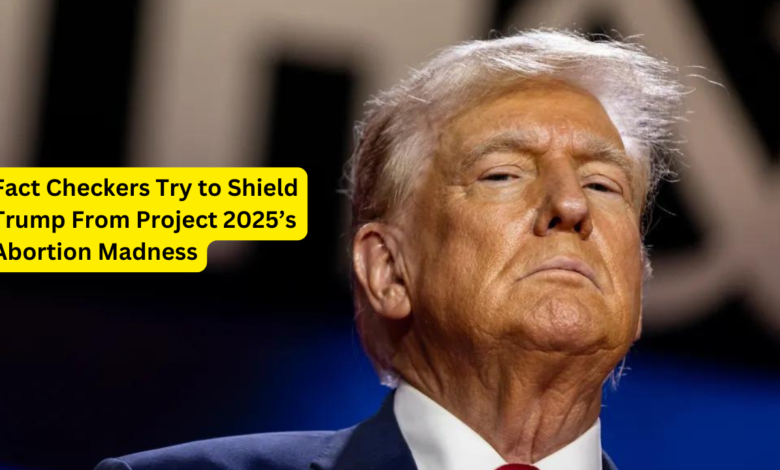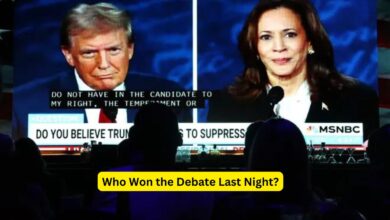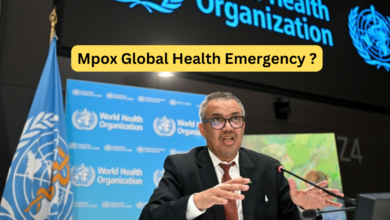Fact Checkers Try to Shield Trump From Project 2025’s Abortion Madness

Fact Checkers Try to Shield Trump From Project 2025’s Abortion Madness, In the complex world of political fact-checking, few topics are as contentious and polarizing as abortion. Recent developments surrounding Project 2025 and former President Donald Trump have placed this issue back in the spotlight. This article aims to provide an in-depth analysis of the claims, counterclaims, and the role of fact-checkers in navigating this fraught terrain.
Understanding Shield Trump From Project 2025
Project 2025 is a significant political initiative with far-reaching implications for U.S. abortion policy. Launched by conservative organizations, this project outlines a comprehensive strategy to reshape federal abortion regulations. The plan’s goals include restricting abortion access and reshaping how abortion services are administered nationwide.
The debate over Project 2025 has intensified as it draws scrutiny from various quarters. Supporters argue that the initiative is a necessary step to protect unborn lives and uphold traditional values. Critics, however, view it as an extreme measure that could infringe on reproductive rights and undermine established precedents.
Trump’s Connection to Project 2025
Former President Donald Trump’s association with Project 2025 has become a focal point of political discourse. His endorsement of the initiative and his alignment with its objectives have sparked significant debate. Trump’s supporters argue that his involvement reflects his commitment to conservative principles and his desire to enact meaningful change in U.S. abortion laws.
On the other hand, opponents argue that Trump’s role in Project 2025 reflects his broader agenda to influence federal policy and challenge existing legal frameworks. This clash of perspectives underscores the broader divide in American politics regarding abortion and related issues.
The Role of Fact Checkers in the Debate
In the age of misinformation, fact-checkers play a crucial role in ensuring that the public receives accurate and unbiased information. However, the fact-checking process itself is not immune to controversy. Recent claims suggest that fact-checkers are attempting to shield Trump from criticisms related to Project 2025, raising questions about the integrity and impartiality of these efforts.
Examining Fact-Checking Practices
Fact-checkers are tasked with verifying the accuracy of statements and claims made by public figures. Their work involves cross-referencing information with credible sources, assessing the context, and providing a verdict on the accuracy of the statements in question. Despite their best efforts, the fact-checking process can be influenced by various factors, including political bias, the sources consulted, and the methodologies employed.
In the case of Trump and Project 2025, some critics argue that fact-checkers are downplaying or ignoring certain aspects of the project’s implications. This has led to accusations that the fact-checking process is being used to protect Trump rather than providing a balanced view of the situation.
Impact of Fact-Checking on Public Perception
The way fact-checkers present information can significantly impact public perception. When fact-checking organizations are perceived as biased or selective in their reporting, it can erode trust in their findings. This issue is particularly pronounced in politically charged debates, where every piece of information is scrutinized through a partisan lens.
In the context of Trump and Project 2025, the role of fact-checkers has been under intense scrutiny. Some argue that the fact-checking industry needs to reassess its practices to ensure greater transparency and fairness in its evaluations. This reassessment could help address concerns about bias and improve the public’s confidence in fact-checking efforts.
Analyzing the Claims and Counterclaims
Trump’s Stance on Abortion
Trump’s statements on abortion have been a subject of intense debate. His support for Project 2025 aligns with his broader stance on abortion, which has often been described as conservative. Proponents of his views argue that Trump’s policies reflect a commitment to protecting unborn lives and upholding traditional values.
Conversely, critics argue that Trump’s stance represents an attempt to undermine reproductive rights and impose restrictive measures on women’s health. These contrasting views highlight the deep divisions in American politics regarding abortion and underscore the challenges faced by fact-checkers in navigating this complex landscape.
Project 2025’s Implications
Project 2025 outlines several proposed changes to federal abortion policy, including restrictions on access and modifications to existing regulations. Supporters argue that these changes are necessary to protect unborn lives and align with conservative values. Critics, however, view the proposals as extreme and detrimental to reproductive rights.
The debate over Project 2025’s implications reflects broader societal tensions surrounding abortion and highlights the challenges of evaluating such a multifaceted issue. Fact-checkers must navigate these complexities to provide accurate and balanced information to the public.
The Broader Context: Misinformation and Bias
The discussion surrounding Trump, Project 2025, and fact-checking is part of a larger conversation about misinformation and bias in the media. As political discourse becomes increasingly polarized, the challenge of providing accurate and unbiased information becomes more pronounced.
Combating Misinformation
Addressing misinformation requires a multifaceted approach that includes rigorous fact-checking, transparent reporting practices, and efforts to combat fake news. Fact-checkers play a critical role in this process, but their effectiveness depends on their ability to maintain impartiality and credibility.
Navigating Bias
Bias is an inherent challenge in political reporting and fact-checking. Both media organizations and fact-checkers must strive to minimize bias and present information in a fair and balanced manner. This effort involves careful scrutiny of sources, rigorous methodology, and a commitment to transparency.
Conclusion: Reflecting on the Debate
The intersection of fact-checking, Project 2025, and Trump’s involvement raises important questions about the nature of political discourse and the role of fact-checkers in shaping public perception. As the debate continues, it is crucial for all parties involved to prioritize accuracy, transparency, and impartiality in their efforts.
What are your thoughts on the role of fact-checkers in political debates? Do you believe that fact-checking organizations are providing a balanced view of issues like Project 2025, or do you think there are biases at play? Share your thoughts in the comments below!





One Comment